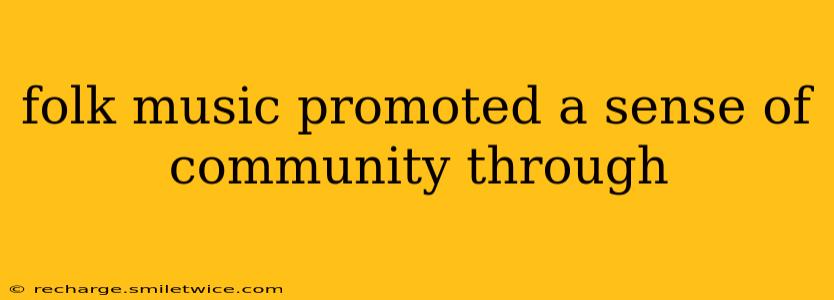Folk music, with its deep roots in oral tradition and its intimate connection to the lives of its creators and audiences, has historically played a vital role in fostering a powerful sense of community. Far from being mere entertainment, folk music acted (and continues to act) as a glue, binding people together through shared experiences, cultural identity, and a collective expression of emotion. This essay will explore the multifaceted ways folk music promoted – and continues to promote – a sense of community.
How Did Folk Music Create a Sense of Shared Identity?
Folk music's strength in building community lies in its ability to articulate shared experiences and values. Songs often recount historical events, local legends, or everyday struggles, creating a sense of collective memory and shared identity. For instance, protest songs during the Civil Rights movement used folk music to unite individuals fighting for equality, giving voice to their shared grievances and aspirations. Similarly, sea shanties, work songs, and other forms of traditional folk music bound together groups of individuals who shared a particular occupation or lifestyle. These songs reflected their common experiences and provided a shared language through which they could express their joys, sorrows, and aspirations. The very act of singing together created a powerful bond, reinforcing the sense of belonging.
What Role Did Folk Music Play in Preserving Cultural Heritage?
Folk music acted as a powerful vehicle for transmitting cultural heritage across generations. Passed down orally, these songs carried within them stories, traditions, and beliefs that shaped the collective identity of communities. By singing these songs, members of a community reaffirmed their cultural heritage and ensured its survival. This oral tradition built a sense of continuity and connected people to their ancestors, strengthening their sense of belonging and shared history. For example, Native American storytelling songs preserved their rich traditions and connected generations to their cultural heritage.
How Did Folk Music Facilitate Social Change and Protest?
Throughout history, folk music has served as a powerful tool for social change and protest. Songs often gave voice to marginalized communities, highlighting injustices and inspiring collective action. The protest songs of the American Civil Rights movement, for instance, are a potent example of folk music’s ability to unite individuals in a common cause. By articulating shared grievances and aspirations, these songs empowered listeners and fostered a sense of solidarity among those fighting for social justice. This unifying power significantly contributed to the social and political change they sought.
Did Folk Music Unite People Across Geographical Boundaries?
Yes, while folk music often reflects local traditions and experiences, it also possesses a remarkable ability to transcend geographical boundaries. The widespread popularity of certain folk songs and musical styles showcases the power of music to unite people across diverse regions and cultures. The adoption and adaptation of folk tunes across different communities demonstrate a shared human experience and a common need for expression. This cross-cultural exchange not only strengthens individual communities but also enriches global musical culture, building bridges between people from diverse backgrounds.
How Does Modern Folk Music Continue to Foster Community?
Even in the modern era, where globalization and technological advancements have dramatically altered the social landscape, folk music continues to foster a sense of community. Contemporary folk musicians often draw inspiration from traditional styles while incorporating elements of modern life and experiences. This allows them to connect with younger generations and create a sense of shared identity that incorporates both tradition and innovation. Furthermore, the rise of online communities and social media platforms has created new ways for folk music enthusiasts to connect, share their music, and participate in collective musical experiences, thereby furthering the sense of community fostered by this timeless genre.
In conclusion, folk music has a uniquely powerful ability to foster a sense of community. By acting as a vehicle for shared experiences, cultural preservation, social change, and cross-cultural exchange, it has served as a unifying force throughout history and continues to do so today. Its enduring relevance lies in its ability to express the universal human desire for connection, belonging, and shared identity.
